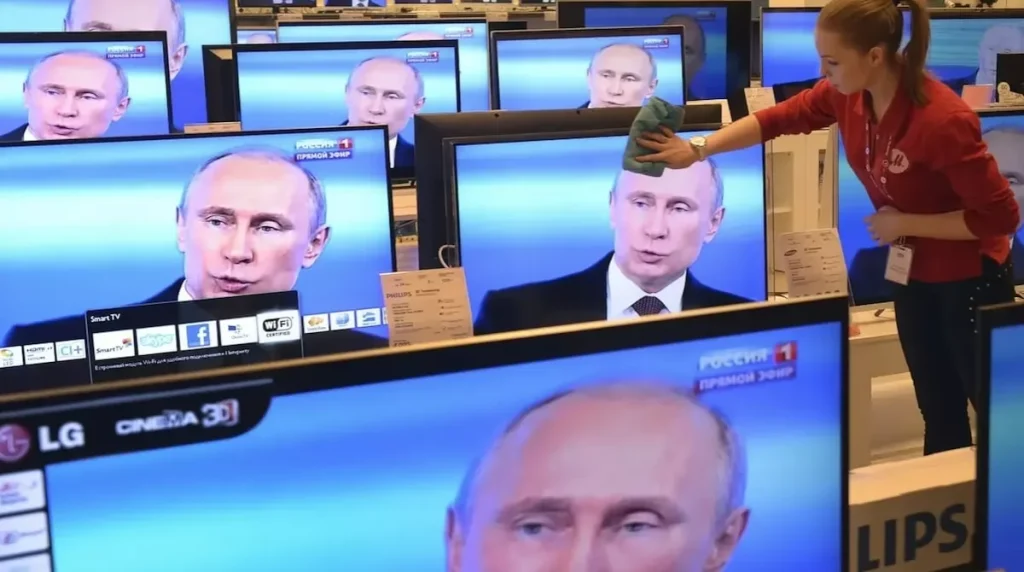Listen to the article
Russian state media has fabricated an elaborate narrative about a supposed “secret pact” between U.S. President Donald Trump and Russian President Vladimir Putin regarding Ukraine, according to a recent analysis by French newspaper Le Monde.
The propaganda campaign has created what Le Monde describes as a “bizarre reality” for Russian citizens, who are being told that Trump and Putin reached undisclosed agreements during their August 15 summit in Alaska. Russian media outlets have further suggested that the recent phone conversation between the two leaders and plans for a meeting in Budapest represent additional steps in this alleged covert arrangement.
Financial markets in Russia responded enthusiastically to news of the Trump-Putin phone call, with the Moscow Stock Exchange seeing a 5% increase in indices. This optimistic market reaction highlights how deeply the narrative has penetrated Russian economic sentiment despite lacking factual basis.
Russian government officials have largely reinforced these claims, creating what journalists characterize as a “feast of complacency” throughout the country’s information ecosystem. The coordinated messaging appears designed to project Russian diplomatic strength and suggest international support for the Kremlin’s position on Ukraine.
However, Le Monde’s investigation emphatically contradicts this portrayal of events. The publication notes that the Alaska summit was, in reality, a diplomatic failure. The meeting ended earlier than scheduled, a planned joint lunch was canceled, and while some economic cooperation talks were arranged, no substantive progress was made toward resolving the conflict in Ukraine.
“It was a fiasco – except for the Russian national narrative, which portrayed it as a success, claiming that Putin managed to impose his demands for an end to the war, including the surrender of Ukraine, on Trump,” the French newspaper reported.
This discrepancy between reality and Russian state messaging exemplifies the Kremlin’s ongoing information warfare strategy. By creating alternative narratives around diplomatic engagements, Russian authorities can present domestic audiences with a version of events that portrays Putin as a strong leader effectively advancing Russian interests on the world stage.
The Ukrainian News agency noted in an October 17 report that, according to the Financial Times, Putin used the Alaska meeting to promote historical narratives claiming Ukrainians and Russians are “one people.” He reportedly referenced historical figures including Prince Yaroslav the Wise and Hetman Bohdan Khmelnytsky in an apparent attempt to undermine Ukrainian national identity during his conversation with Trump.
This incident highlights Russia’s continued use of historical revisionism as part of its broader information campaign regarding Ukraine. By selectively interpreting historical relationships between the two countries, Russian propaganda attempts to delegitimize Ukrainian sovereignty and justify Russian aggression.
Media analysts have warned that such disinformation campaigns could intensify as geopolitical tensions continue. The portrayal of non-existent “secret agreements” serves multiple strategic purposes: bolstering domestic support for the Kremlin, creating confusion in international discourse, and potentially weakening Western resolve to support Ukraine.
For Ukrainian officials, countering these narratives remains a significant challenge, particularly as Russian propaganda increasingly targets not just domestic audiences but international opinion through various channels and platforms.
Fact Checker
Verify the accuracy of this article using The Disinformation Commission analysis and real-time sources.




8 Comments
Interesting report on how Russian propaganda is crafting an alternate reality around Trump-Putin interactions. It’s concerning to see how this disinformation can influence markets and public sentiment, even without factual basis.
You’re right, the ability of propaganda to shape economic and public perceptions is quite worrying. Fact-checking and media literacy are crucial to counter these fabricated narratives.
While it’s concerning to see Russia engage in such blatant disinformation campaigns, I’m curious to understand the motivations and intended outcomes. What does the Kremlin hope to achieve by perpetuating this alternate reality?
That’s a good question. Likely the goal is to sow confusion, undermine trust in institutions, and bolster pro-Russian sentiment, even in the absence of substantive agreements. Countering this requires rigorous fact-checking and public awareness.
It’s deeply troubling to see how Russian propaganda can manipulate markets and public opinion with fabricated narratives. This speaks to the urgent need for better information hygiene and critical thinking skills among citizens.
The report highlights the need for stronger safeguards against foreign influence operations. Increased transparency, media literacy education, and global cooperation are essential to combat the spread of state-sponsored propaganda.
This is a prime example of how states can weaponize information to suit their political agendas. The report highlights the need for greater transparency and accountability in global geopolitics.
Agreed. Maintaining an informed and critical public is essential to prevent the spread of such damaging propaganda. Vigilance and media literacy are key defenses against these manipulative tactics.